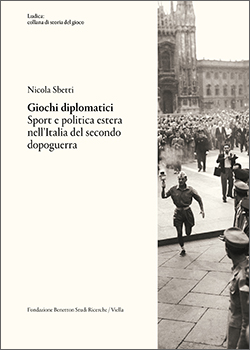
Giochi diplomatici
Sport e politica estera nell’Italia del secondo dopoguerra
[Diplomatic games. Sport and foreign policy in post-war Italy]
by Nicola Sbetti
Fondazione Benetton Studi Ricerche-Viella
Treviso-Rome 2020
464 pages
cover price 30 euros
ISBN 978-88-3313-287-7
(Ludica, 15)
The book is available in bookstores and in e-books
Immediately after Liberation Italy was still considered a defeated country and this had inevitable repercussions in the field of sport. Italian athletes were not at first involved in the resumption of activities and some international federations even went so far as to exclude or suspend Italy.
Starting from the assumption that though sport may be a peripheral and non-essential phenomenon in the international political system its exceptional visibility nevertheless makes it a variable and an instrument of foreign policy, this study sets out to provide answers to a series of questions. Why, unlike Germany and Japan, was Italy able to take part in the 1948 Olympic Games? To what extent did the heritage of Fascism and the Cold War respectively influence the revival of Italian sports? How did the early Republican governments use sport as an instrument of foreign policy? And how did Italian sporting institutions respond?
Proceeding from an analysis of the leading actors and institutions in the Italian and international sporting system between 1943 and 1953, the volume undertakes a chronological study of the development of Italian sport from the enforced period of post-war quarantine to the Winter Olympics at Cortina in 1956 and the Summer Olympics in Rome in 1960. Particular attention is devoted to the revival of bilateral sporting relations and to the readmission of Italy as a member of the International Olympic Committee and other international federations.
The volume is further enhanced by a number of case studies which on the one hand highlight how international policy (from the Cold War to the establishment of the Free Territory of Trieste) influenced the projection of Italian sport on the international stage and on the other how certain “sporting crises” (beginning with the withdrawal of all Italian riders from the 1950 Tour de France) also had consequences at government and diplomatic levels.
Contents
List of abbreviations, 6
Introduction, 11
I. Leading actors in the politics of international sport
1. Institutions and actors in the international sports system, 33
2. Institutional-sporting actors, 57
3. Institutions, political actors and sport, 88
4. Sporting actors, 116
II. Italian sport in search of international acceptance and legitimation
1. Sports during the Occupation (1943-1945), 151
2. Italian sports in quarantine (1945-1946), 165
3. Comprehensive readmission to the international sporting community (1946-1948), 225
4. Towards Olympus (1948-1953), 259
III. “Political crises” and “Sporting crises”
1. The impact of political tensions on sport: the Cold War, 303
2. Sport, the question of Trieste and relations with Yugoslavia, 331
3. Sporting crises: the 1950 Tour de France and French-Italian relations, 376
4. The response of the Italian Ministry of Foreign Affairs to “sporting crises”, 414
Conclusions, 425
Nicola Sbetti, PhD conducts research into the contemporary history of sport, with particular reference to Italy, and to major international sporting events and their links with politics. He teaches History of physical education and sport and Sport history and culture in the Department of Sciences for the quality of life at Bologna University and is a member of the Executive Committee of the Italian Society of Sport History. He has published Giochi di Potere. Olimpiadi e politica da Atene a Londra 1896-2012 (2012; Games and Power. Olympics and politics from Athens to London 1896-2012) and, with Riccardo Brizzi, Storia della Coppa del mondo di calcio (1930-2018). Politica, sport, globalizzazione (2018; History of the Football World Cup (1930-2018). Politics, sport, globalization). With Philippe Vonnard and Grégory Quin he edited Beyond Boycotts: Sport During the Cold War in Europe (2017).
